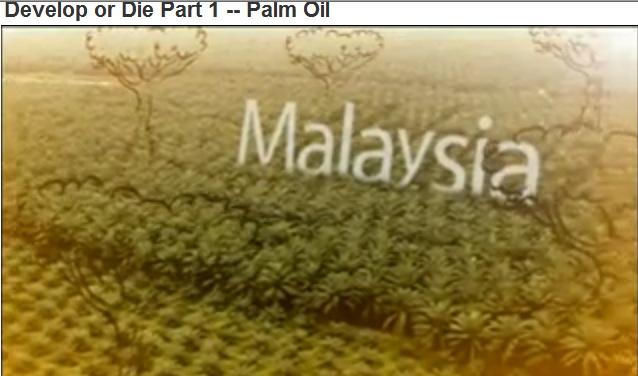
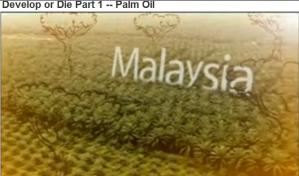 The Develop or Die series was commissioned to promote the Malaysian Palm Oil industry, but promoted on BBC World as genuine journalism
The Develop or Die series was commissioned to promote the Malaysian Palm Oil industry, but promoted on BBC World as genuine journalism
The BBC has confessed to numerous transgressions of its editorial standards by a number of programmes commissioned from FBC Media about Sarawak and Malaysia.
In a report published today by its governing body, the BBC Trust, the Corporation admitted that the programmes, which were acquired by the BBC for ‘low or nominal cost’ from independent producers, “seriously breached” the BBC’s guidelines on conflicts of interest and the prohibition of sponsorship for current affairs programming.
According to the report, these transgressions “went to the heart of the BBC’s international reputation and risked undermining the integrity of its editorial output”. As a result, the corporation announced it will tighten rules on sponsored programming and has already made a series of changes to the way it acquires and funds programming for its international channel BBC World.
Richard Ayre, who chaired the meeting of the Trust’s Editorial Standards Committee said:
“International audiences must be able to rely on the same integrity and independence in the BBC’s editorial decisions as audiences in the UK. We have found that several programmes shown on the BBC’s World News channel had been inappropriately sponsored, and in the case of one of the independent producers, FBC Media (UK), there was at least a suggestion that the company had a conflict of interest of which the BBC had been unaware. The Trust is deeply concerned at this and we very much regret that these programmes failed to live up to the editorial standards we set for the BBC”. [click here for the full report]
This shame and apology from the BBC, contrasts remarkably with the statement by the Malaysian Minister, Nazri Abdul Aziz, just last week that the BN Government remains happy with the illegal services that FBC were performing at a cost of RM 94 million to the Malaysian taxpayer!
He commented to reporters that FBC’s breaches were only a question of ethics, which was no problem because:
“Since we engaged FBC, we saw an increase in the acceptance of Western countries towards the leadership of Premier Najib Abdul Razak.” [click for statement]
FBC only charged the BBC one pound a programme! – exclusive
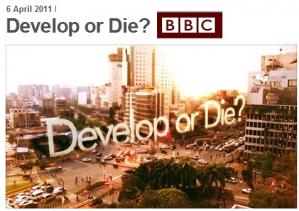
While onlookers consider this lax attitude towards ethics, emanating from the Prime Minister’s own office, and the equally unethical and illegal expenditure of taxpayers’ money on such blatant party political PR, it is also becoming evident that the positive spin of which Nazri speaks is now rapidly backfiring as this scandal continues to unravel.
Sarawak Report can today reveal that we have learnt from exclusive sources that the BBC paid just one pound (RM 5 ringgit) for each of the half hour ‘Develop or Die’ documentaries that it commissioned from FBC Media!
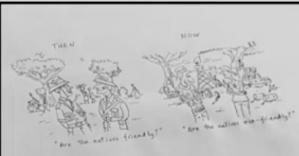
Given that such documentaries generally cost tens, if not hundreds of thousands, of pounds to make, questions over complicity by BBC World’s top managers cannot be avoided.
Executives could not have failed to conclude that FBC had found sponsors elsewhere for this supposedly editorial programme content and today it was acknowledged that senior managers have had to take responsibility for poor decision-making in the quest for cheap programming.
One viewing of ‘Develop or Die’, which focuses on the controversial message that millions will die if more oil palm is not grown, supplies plenty of indications about who FBC Media’s sponsors might be. The production/PR company’s clients included Sime Darby, the Malaysian Government, Taib Mahmud and Iskandar, all of whom received promotion on BBC World programmes.
When Sarawak Report and the UK’s Independent Newspaper first challenged FBC Media about these allegations, the company threatened them with legal action claiming that they had never had any business relationship with any government, including Malaysia. However, the company’s own presentation documents told a different story.
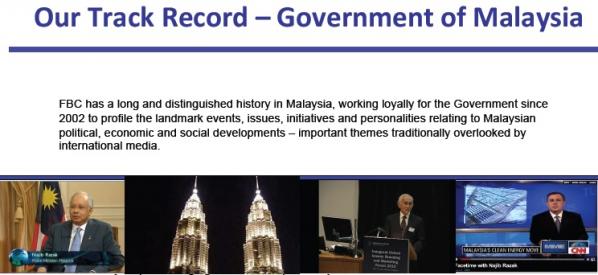
FBC had threatened legal action saying they had never worked for Malaysia. Their own presentations and the Malaysian budget documents proved otherwise!
A BBC spokesman told Sarawak Report that, in the light of these revelations, the corporation “would not rule out” the possibility of returning shortly to Sarawak to engage in genuine, unbiased journalism about the problems of deforestation and the abuses of native rights.
More shock revelations – CNBC CHARGED FBC Media instead of paying them!
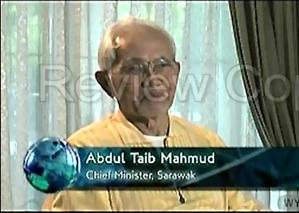
Meanwhile, Sarawak Report is able to point to an even deeper, separate scandal developing at the US owned TV station CNBC.
This company has also severed all ties with FBC Media, which used to produce its flagship weekly business show World Business as well as The Business of Sport, tech watch, Business Week Asia and World Business Special Edition.
However, Sarawak Report has now received information that far from commissioning and paying for these shows, CNBC was CHARGING FBC millions of ringgit for access to this ‘media platform’, on which it could promote its clients! Such an arrangement represents a flagrant breach of broadcasting laws, which prohibit the secret sponsorship of all news programmes and CNBC executives would therefore appear to be deeply culpable.
Our information from a variety of sources is that that CNBC were demanding a payment of £1.5 million pounds a year from FBC Media for its European World Business platform and a further £500,000 for Business Week Asia. As a result, it it not surprising that the programme was blatantly marketed by FBC as an ‘Advertorial’ opportunity to its PR clients – despite this being strictly illegal in an news editorial show.
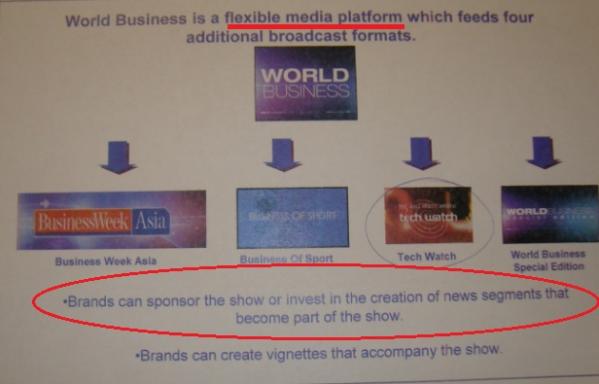
The involvement of the US broadcaster (part of NBC, which is one of America’s top three networks) in this deal has already been demonstrated by our earlier publication of company records showing that 2005 CNBC deliberately altered the funding arrangements for the World Business Show, so that it would cover its own costs from ‘sponsorship’. [See UK Independent Newspaper coverage]

Global News Fixing
Therefore, our evidence indicates that CNBC were not just turning a blind eye to cheap programming, which the BBC have also admitted to today. They were actually demanding payment for leasing out their news slots, practice which for obvious reasons is strictly forbidden by the regulators.
We have further learnt that when FBC fell behind in its payments, the company’s Director of Global Sales Operations threatened in a meeting to withdraw the production company’s right to produce the show. The money was rapidly found!
In return, we understand that FBC Media was given total editorial control and content copyright for the programme, so that they could use the product as it liked. This arrangement further clearly violated the strict Ofcom (UK regulator) rules that it is the broadcaster who takes ultimate responsibility for the output on its channels.
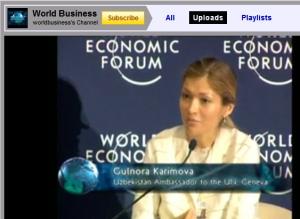
With such funding arrangements in place FBC, unsurprisingly touted all its CNBC platforms to its potential clients, which included some of the world’s most controversial industries and infamous politicians.
For example, Gulnara Karimova paid FBC Media 28,000 euros each for a series of appearances on World Business. She also used the PR company’s public profile as an influential broadcaster to get access to such figures as Klaus Swab, the leader of the World Economic Forum. Other clients included the deposed regime in Egypt and the governments of Azerbijan and Kazakhstan.
But, Malaysia appears to have been the best clients [see UK Guardian newspaper coverage]. Taib Mahmud spent a staggering 82,000 euros (RM 350,000 ringgit) of Sarawak taxpayers’ money, on just one promotional film about his leadership in Sarawak, aired just before the State Election in March.
The copy of the contract, which we have acquired, between FBC and the Chief Minister spells out the arrangement, along with the blogging and other PR services being offered by the company for a total of $5 million dollars a year.

Today, CNBC stated that the company has yet to publish its findings into the affair and said it was waiting for feedback from the regulator Ofcom. Despite our questions, It failed to address the allegations that it sold newspace for millions of dollars to FBC, but said in a statement:
“FBC produced World Business for CNBC and other outlets. FBC was contractually obligated to produce Ofcom compliant programmes. After questions were raised CNBC immediately suspended airing of World Business and launched an internal investigation. CNBC has since served notice to FBC to terminate its agreement with the company. We are presently liaising with Ofcom to ensure that all relevant information is provided and we cannot comment further at this time”.
CNN under growing pressure
The report by the BBC and on-going investigation by CNBC leaves CNN, which also featured numerous FBC clients in an exposed position. CNN’s Business Anchor-Man, John Defterios, was until earlier this year the President of FBC. He had also acted as the Presenter/host of World Business as well as its Managing Editor.
Defterios had occupied these roles at the same time as he was flogging the slot to the company’s PR clients like Microsoft in 2004.
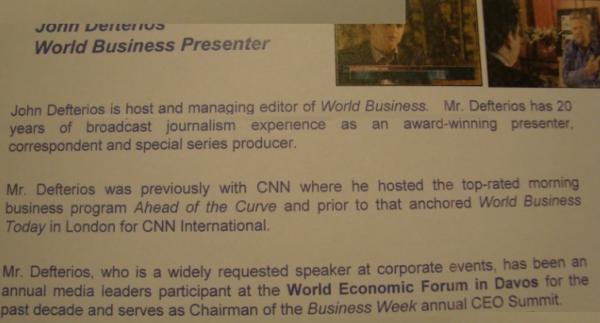
Defterios now anchors CNN's Market Place Middle East. He was President of FBC from 2000- 2011 and hosted World Business at the same time, during which he pitched the show to clients like Microsoft
Defterios was still a Director, sharholder and President of FBC earlier this year long after he had returned to anchoring CNN programmes, first as a freelance and then staff member. His ‘soft-ball’ interview with Najib Razak, a major client of his company, after the July Bersih rally raised question marks in Malaysia long before FBC’s links with Malaysia were revealed.
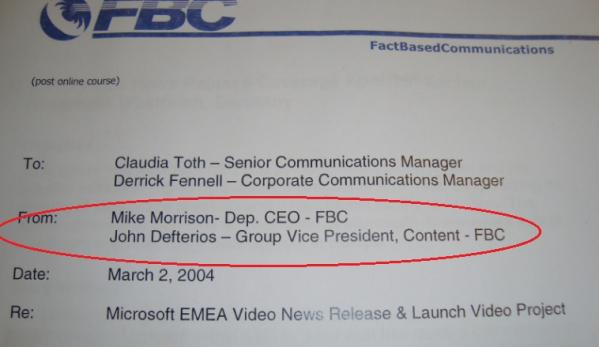
Defterios pitched for a successful PR contract with Microsoft, which included a "guaranteed distribution placement" on FBC's World Business Programme, which he was presenting
Nevertheless, CNN has so far refused to question the propriety of their anchor-man or to investigate whether any of those programme placements on CNN shows, which he was in a position to influence, could have been compromised by further conflicts of interest over FBC media clients. As more and more information emerges CNN’s credibility has started to suffer over this refusal to investigate FBC’s influence over their programming through its president and their presenter, John Defterios.
Wider problem
The scandals exposed as a result of Malaysia’s political PR and greenwash campaigns through companies like FBC Media have clearly been revealed as the tip of an iceberg of media corrupted by money.
The tactics of ‘Greenwash’ also need more thorough exposure, since the BBC today attempted to salvage the claim that FBC programmes did not breach the guidelines on impartiality on behalf of their clients!
This is despite the fact that we can show that FBC presentations clearly explain to their clients exactly how the company goes about giving the appearance of impartiality, while deliberately favouring the arguments of their clients – a tactic demonstrated repeatedly in the Develop of Die series, as acknowledged by the BBC report.
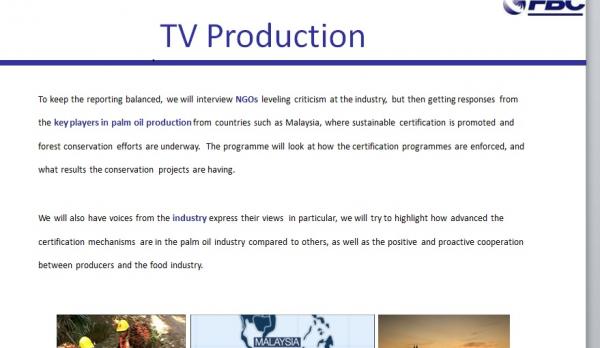
Time for the BBC to also admit the shows were not 'impartial' - FBC explains to its clients how they propose to give the appearance of impartiality in their BBC films, while in fact favouring their clients!
The BBC Trust report also worryingly acknowledges other independent producers were also providing shows for BBC World that were equally tainted by corruption. The report refers to the show Earth Reporters, which is promoted as an eco-programme, but for which independent production companies were blatanty touting for sponsorship.
Indeed the Editor of Sarawak Report was invited by one production company to become themself an ‘Earth Reporter’, as an opportunity to raise awareness for our project. However, it soon was made clear that Sarawak Report would need to find its own sponsors to raise £50,000 to pay for the production!
If we could find the money, we were informed, we would be ‘guaranteed a platform’. Doubtless it would be sympathetic!
Unlike the Malaysian palm oil industry, Taib Mahmud and Najib Razak we chose not to buy into a clearly corrupted business.
Your views are valuable to us, but Sarawak Report kindly requests that comments be deposited in suitable language and do not support racism or violence or we will be forced to withdraw them from the site.